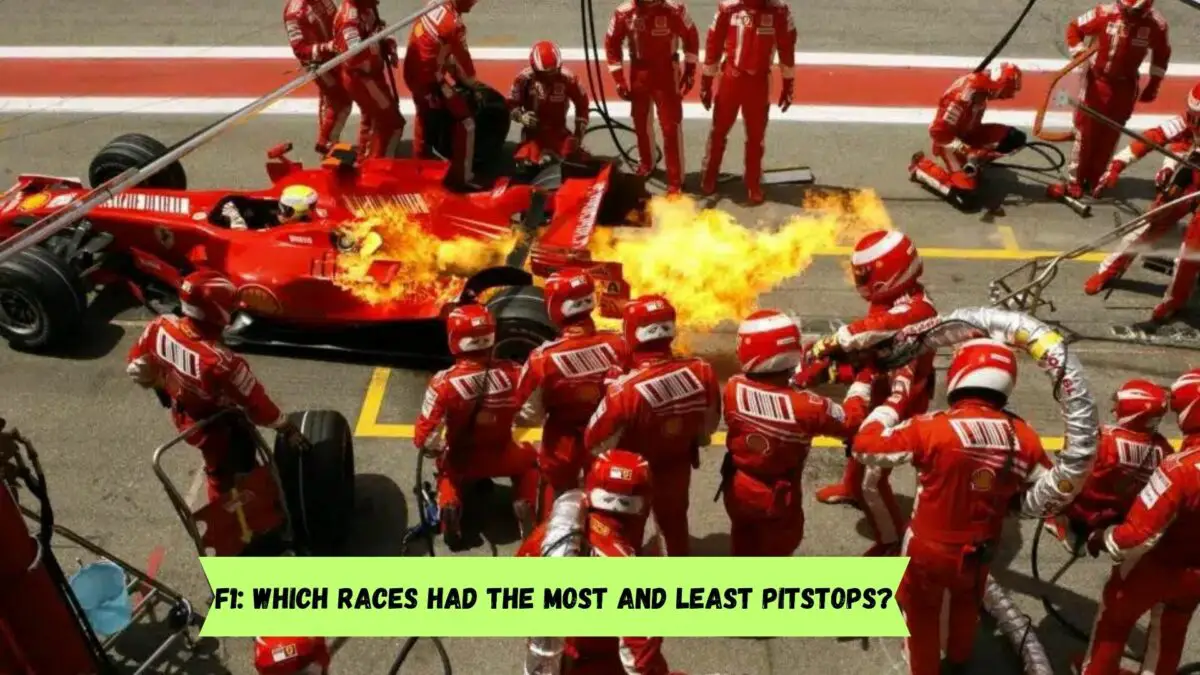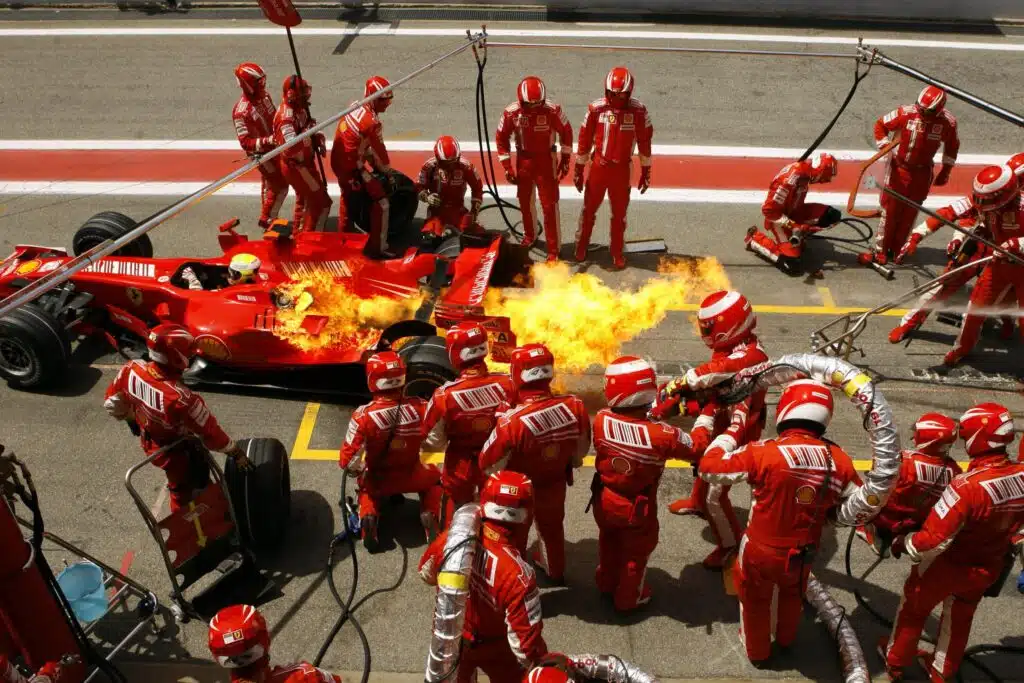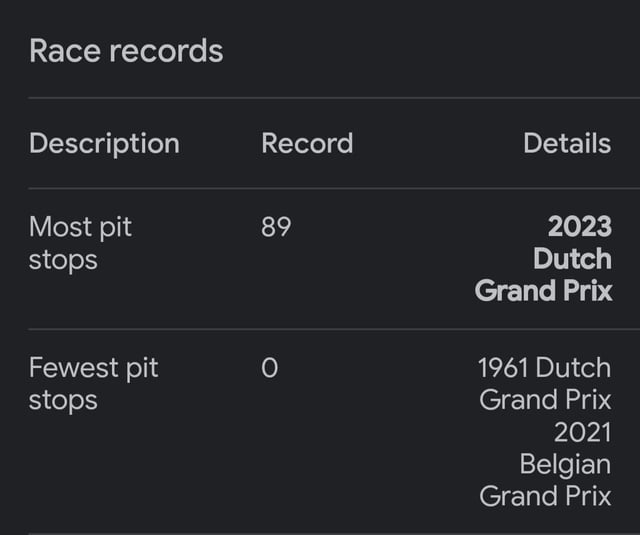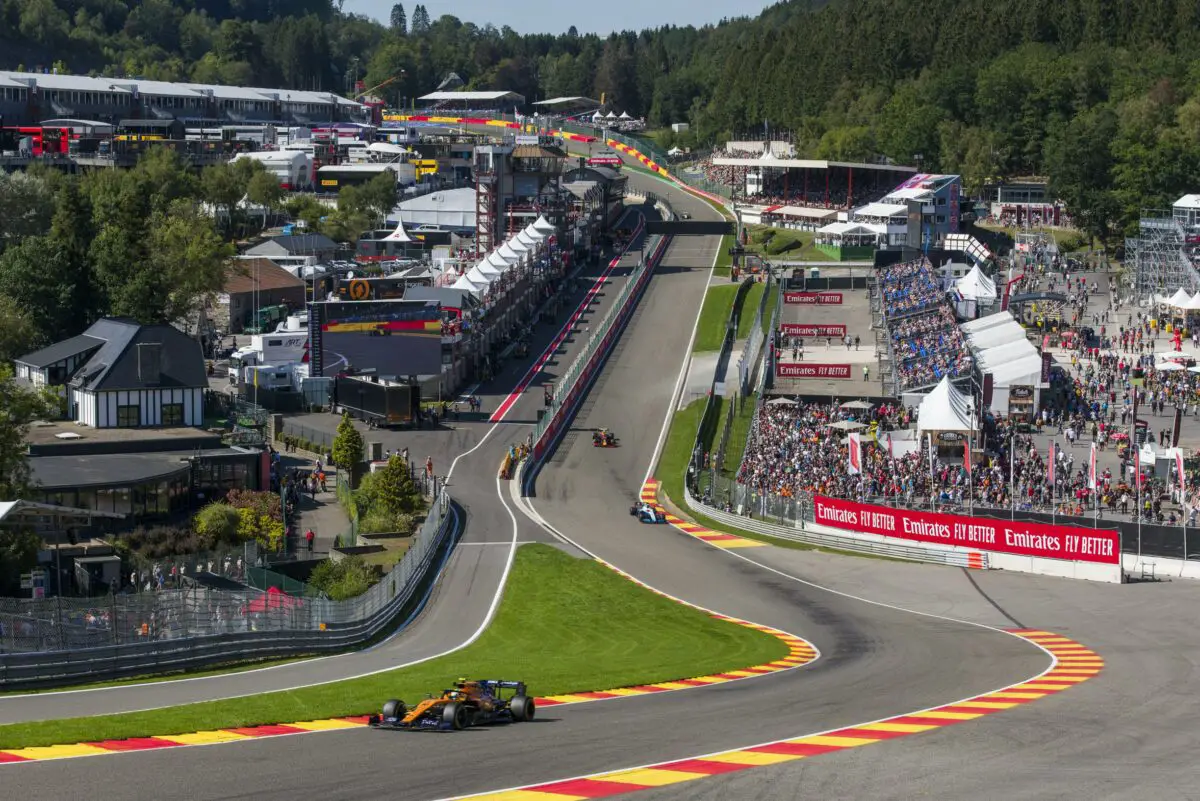Pitstops are very crucial in F1 racing – here are a few interesting records associated with it – most and least pitstops.

In the world of motorsports, a pit stop is a designated time for various tasks like refueling, changing tires, making repairs, adjusting the car’s mechanics, switching drivers, serving penalties, or a combination of these activities. These stops take place in an area known as “the pits,” which is typically accessible through a pit lane running parallel to the track’s main straight and connected at both ends.
Along this pit lane, you’ll find a line of garages, usually one for each team or car, where the pit crew, which can consist of up to twenty mechanics based on series regulations, efficiently carries out the required work in a designated pit box.

In Formula One, refueling during the race has been prohibited since 2010. Instead, pit stops are primarily focused on changing tires. Occasionally, teams may make additional adjustments to the car’s front and rear wings and carry out minor repairs, such as replacing the nose and front wing assembly.
These pit stops are incredibly swift, usually taking only 2 to 3 seconds to complete. McLaren currently holds the world record for the quickest pit stop, achieved at the 2023 Qatar Grand Prix with a remarkable 1.80-second stop executed on Lando Norris’s car.
Do you wonder which F1 races might have had the most and least number of pitstops? Let us take a look below.
The 2023 Dutch Grand Prix made history by featuring the highest number of pit stops ever in Formula 1. This race was significantly influenced by wet weather conditions and saw Red Bull Racing’s Max Verstappen emerging as the winner, starting from pole position. He was followed by Fernando Alonso of Aston Martin and Pierre Gasly of Alpine, marking Gasly’s first podium finish of the season. Verstappen’s victory marked his ninth consecutive win, matching Sebastian Vettel’s record. Notably, Liam Lawson had his Formula One Grand Prix debut in this race, stepping in for AlphaTauri driver Daniel Ricciardo, who had injured his hand during a practice session.

The 2023 Dutch Grand Prix set a remarkable record with a total of 89 pit stops, but that wasn’t the only record established during this exciting race. Thanks to two significant rainstorms at Circuit Zandvoort, there were an unprecedented 189 overtaking maneuvers, making it an unforgettable experience for fans. The previous record for the most overtakes in a race was held by the 2016 F1 Chinese Grand Prix, which featured 170 overtakes. What’s even more astonishing is that more than a third of these overtakes occurred in a single lap. During the third lap of the F1 Dutch Grand Prix, heavy rain led multiple cars to enter the pits for tire changes, resulting in a staggering 63 overtakes in that single lap. This set a new F1 record, surpassing the previous high of 45 overtakes in a single lap.
When it comes to the fewest pit stops in Formula 1 history, the record is shared by two races: the 1961 Dutch Grand Prix and the 2021 Belgian Grand Prix, both of which had zero pit stops. The 1961 Dutch Grand Prix was unique in that it was the first of 15 races in Formula 1 history where every car that started the race was classified as a finisher. Notably, none of the drivers made any pit stops during this race. The 2021 Belgian Grand Prix shares this distinction as one of only two World Championship races to have no pit stops, with the other race being red-flagged after just two laps due to adverse weather conditions.

The 2021 Belgian Grand Prix was originally scheduled to consist of 44 laps. However, due to extremely wet conditions, the race was halted after just the third lap. The first two laps were conducted behind the safety car before a red flag brought the race to a stop during the third lap. According to the sporting regulations, the race results were determined based on the end of lap one, and drivers who finished in the top 10 positions were awarded half points because less than 75% of the initially planned race distance had been completed.
Conclusion
As of 2023, the 2021 Belgian Grand Prix holds the distinction of being the shortest Formula One World Championship race in terms of both distance (6.880 km or 4.275 mi) and the number of laps raced, which was just one lap. This race stands out as the only World Championship race in Formula One history to have no running under full green flag conditions.
Moreover, it marked the first time since the 2009 Malaysian Grand Prix that half points were awarded, and this was the sixth instance of such an occurrence in Formula One. Regulation changes for the 2022 season meant that half-points could no longer be awarded in subsequent seasons. The decision to run two laps behind the safety car and then red-flagging the race on lap three sparked significant controversy within the Formula One community.
More Formula One News
- Lewis Hamilton doesn’t support IOC’s decision on Black Lives Matter gear during Olympics
- Max Verstappen left surprised as he reaches 100 race milestone with Red Bull
- Damon Hill left in awe after Lewis Hamilton racks up 100 poles in F1 ahead of 2021 Spanish GP
Follow our dedicated Formula One page for instant Formula One news and updates

